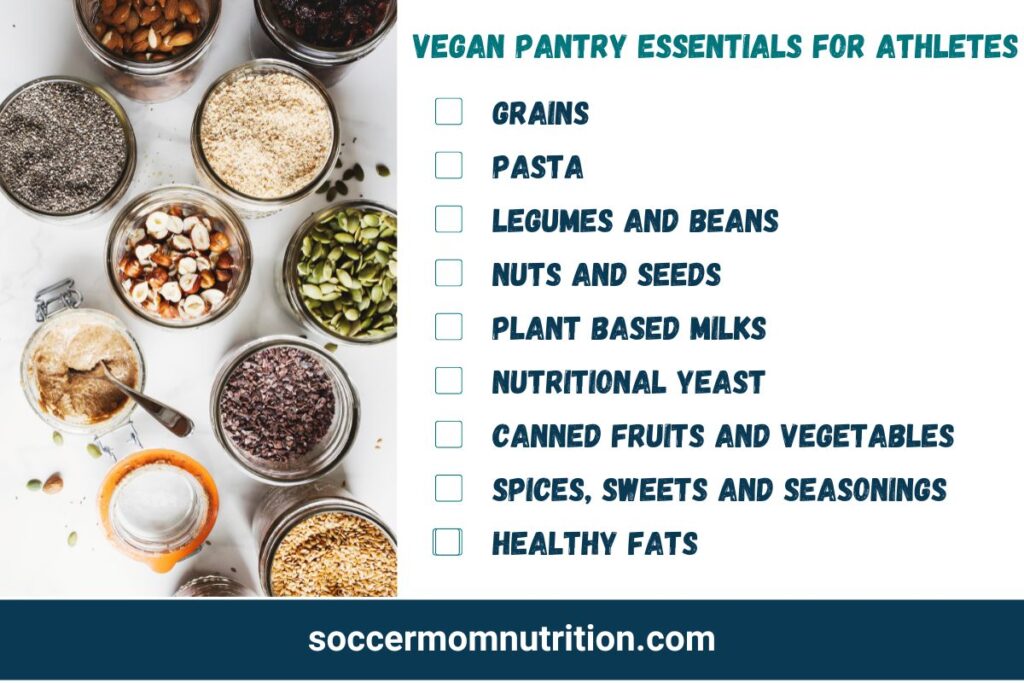10 Best Vegan Pantry Staples for Athletes
With the right vegan pantry staples, you’ll have the essential nutrients you need for optimal performance. When you prioritize your sports nutrition plan you’ll have the energy you need to perform your best.
But, being vegan doesn’t mean compromising on your sports nutrition performance plan.
A well-stocked vegan pantry can provide you with a range of plant-based foods.
They’re also high in complex carbohydrates, high fiber, healthy fats and protein to support your training and competition needs.
Whether it’s game day or a practice session, stock your pantry with vegan staples to help you meet your energy goals for performance.
Now, let’s talk about some vegan pantry staples high in carbohydrates and protein. They’ll fuel your body for your games and support muscle recovery. You may also find some of these staples on our high protein vegan snacks list.
Read on for a variety of options to help you build a well-rounded vegan pantry that supports your athletic goals.

What are vegan pantry staples
Vegan pantry staples are the foundation of many vegan and plant based meals. You can incorporate them into healthy and balanced athlete diet plans.
Most of these pantry staples are foods you’re used to eating like beans, oats, quinoa, whole wheat pasta, whole grain crackers, nuts, dried fruits, cereal, plant based milks, and canned fruits and vegetables and energy bars.
Since these pantry staples can be kept on hand for awhile, stock up to use them in a variety of vegan recipes.
What do you need in a vegan pantry
In a vegan pantry you need a variety of plant-based foods on hand to ensure a balanced and nutritious diet.
Carbohydrates, proteins, healthy fats, fruits, and vegetables are all important components of a well-rounded vegan diet that provide fiber, antioxidants and minerals.
Whole grains like quinoa and brown rice provide complex carbohydrates for energy, while legumes like lentils and beans offer a healthy source of protein.
Nuts, seeds, and avocados are excellent sources of healthy fats, while a variety of fruits and vegetables provide essential vitamins and minerals.
By incorporating these foods into your vegan pantry, you can ensure that you have all the necessary components to create delicious and nutritious meals that support your overall well-being, digestive health and reduce inflammation.
What are staple vegan foods
Grains
Whole grains are an important source of complex carbohydrates and high fiber in a vegan athlete diet. Whole grains contain B vitamins, including thiamin, riboflavin, niacin, and folate. They also have key minerals like magnesium, zinc and iron.
Some grain pantry staples include: brown rice, quinoa, barley, farro, oats, millet, buckwheat and couscous. Pair the cooked grains with berries and nuts for a filling breakfast or combine with lean proteins and veggies for a healthy lunch.
Pasta
Pasts are a staple in an athlete’s diet. Stock up your pantry with options beyond the regular pasta varieties. From whole wheat to red lentil, brown rice, lentil and chickpea. You can boost your fiber and protein content while you’re filling your muscles stores with energy from carbohydrates.
Legumes and beans
Legumes and beans are a great source of protein with essential amino acids. They also have fiber and other essential vitamins and minerals like iron, folate, magnesium and potassium.
You’ll want to have a variety of canned or dried beans, lentils, chickpeas and peas on hand. Add legumes and beans to soups, salads, wraps to boost of protein, carbs and fiber.
Nuts and seeds
Nuts and seeds are a great source of healthy fats, fiber, protein and other important vitamins and minerals like vitamin E, magnesium and potassium .
Some examples include almonds, walnuts, cashews, chia seeds, flax seeds and pumpkin seeds. Toss nuts and seeds on salad, or for breakfast on cereal, in pancakes or smoothies.
Another great option is peanut butter, almond butter or other seed or nut butters that you can spread on toast, bagels or even blend into a sauce or dip.
Plant-based milk
Plant-based milk, such as soy milk, almond milk, rice milk or hemp milk or oat milk, can be good alternatives to dairy milk.
However, soy milk is the only plant based milk that’s a good source of protein (6-8 grams/serving). You’ll also want to choose a plant based milk that is fortified with calcium and vitamin D.
Nutritional yeast
Nutritional yeast is a popular ingredient in vegan cooking and contains all nine essential amino acids. It adds a cheesy, nutty flavor to dishes.
It provides minerals like zinc, magnesium and selenium. It’s particularly high in B12 which is important for vegans who don’t get enough through their regular diet.
Sprinkle on popcorn, salad and other foods for a umami flavor.
Canned vegetables
Canned vegetables are a good source of vitamins and minerals, including vitamin C, vitamin A, potassium and fiber.
Canned vegetables can be used in soups, stews, casseroles and salads. You can season them with herbs and spices to add flavor.
Canned fruits
Canned fruits are also a good source of vitamins and minerals, including vitamin C, potassium and fiber. However, they may be higher in added sugar than fresh or frozen fruits.
Choose canned fruits packed in water or their own juices instead of syrup. Choose individual fruit cups for easy grab and go snacks.
Canned fruits can be used in a variety of ways, such as in smoothies, yogurt parfaits, oatmeal and on cottage cheese. Mix with fresh fruits for a colorful and nutritious fruit salad.
Healthy oils
Oils such as olives, olive oil, coconut oil, flaxseed oil or avocado oil are good sources of healthy fats that can be used for cooking and baking.
Healthy fats contain omega 3s shown to have an anti inflammatory effect and support brain health. (1)
You can buy olives in individual packets for a quick and healthy snack, especially when combined with some whole grain crackers.
Use healthy oils in moderation in preparing foods or in adding to dressings and sauces.
Spices, sweets and seasonings
Adding herbs, spices, and seasonings to your meals can make them more flavorful and satisfying.
Some common spices to have on hand include garlic powder, cumin, turmeric, italian seasoning and paprika.
Maple syrup is a staple a sweetener for various recipes. You can use to sweeten homemade granola, or drizzle over pancakes.

How do I set up a vegan pantry
- Clean out your pantry: Before you begin, take some time to clean out your pantry and remove any non-vegan items.
- Make a list: Take inventory of the items you already have in your pantry and make a list of the essential items you’ll need to stock up on.
- Shop for pantry staples: Visit your local grocery store, health food store or online retailer to purchase the items on your list.
- Organize your pantry: Once you have all of your items, organize them in your pantry so that they are easy to access and use. Group items together by category, such as grains, legumes, and spices, and label them if needed.
- Meal plan: With your vegan pantry stocked, you can now plan your meals for the week ahead. Look up vegan recipes online or in cookbooks, and make a shopping list for any additional ingredients you’ll need.
- Replenish as needed: As you use up items in your pantry, be sure to replenish them so that you always have the essentials on hand.
Wrap up
Having a well-stocked vegan pantry is essential for athletes looking to fuel their bodies with the right nutrients.
By incorporating a variety of healthy, plant-based staples like grains, legumes, nuts and seeds and oils, you can meet your energy needs and optimize your performance.
Get creative with delicious, nutrient-packed pre game meals and healthy snacks.
With a little planning and preparation, a vegan pantry can help you achieve your athletic goals and maintain a healthy lifestyle.
How will you stock your pantry?
Join our mailing list and get our FREE Pre-Activity Fueling Guide.
Stephanie Magill, MS, RD, CD, FAND has over 22 years of experience in public health and nutrition. As a performance registered dietitian nutritionist, Stephanie specializes in sports nutrition and provides simple and actionable information so that athletes can be well fueled for high performance on and off the field. Stephanie has a Master’s Degree in Nutrition and is a Fellow of the Academy of Nutrition and Dietetics.

